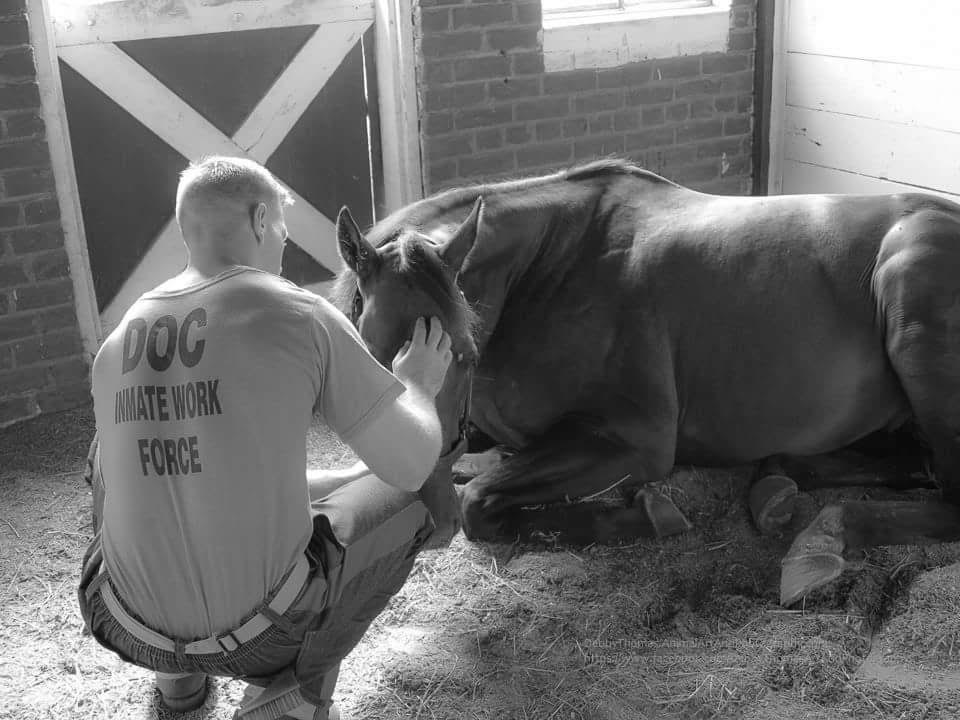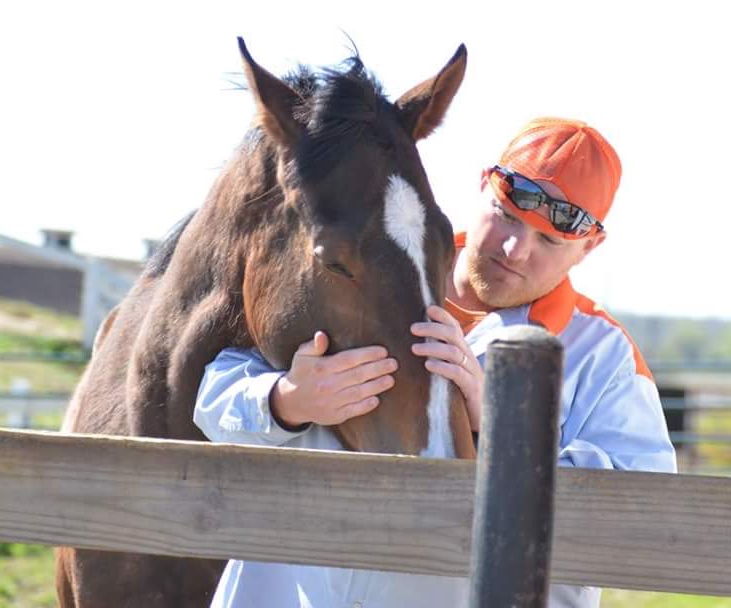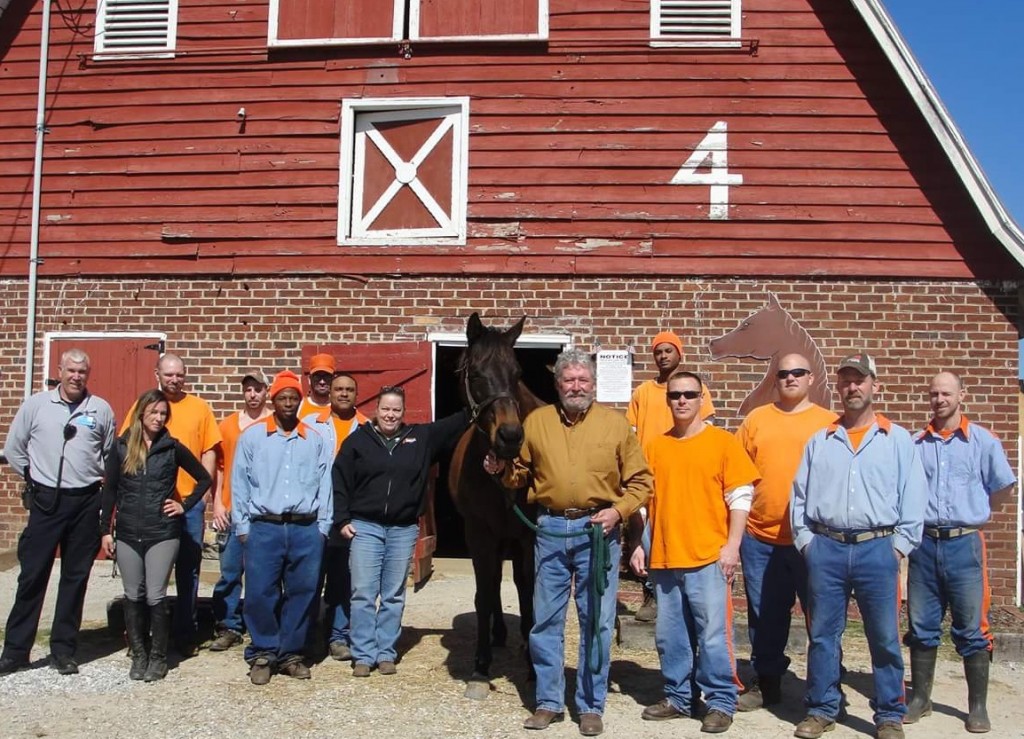
Inmate Wes Goin, a member of the ‘super class’ learning horsemanship at the TRF’s James River location comforts Talkin Stuff, a horse in his care.
Five inmates who shed the prison culture, and worked together as a team to care for horses, just entered the record books as the top-scoring class to graduate from the Thoroughbred Retirement Foundation’s (TRF) unique Second Chances program, which teaches inmates real-world job and horsemanship skills.
So highly did they score on a recent round of testing— never earning lower than an A— that they are now referred to as the “super class” at the James River Work Center in Virginia, says Melissa Jensen, TRF farm manager.
“These guys were so superior that we retained all of them, with the exception of one who is being released to a work-release program, to help teach the next group of Groom Elite/Second Chances students,” she says, noting that the grads have also launched a mentorship effort to teach men, so often living in a culture of survival and self protection, to open up and embrace a team approach.
“For all of us, we were impressed with the exceptional teamwork on their part. In the department of corrections environment, you often find an every-man-for-himself culture. It’s about survival. You don’t give too much of yourself, and you keep to yourself,” she says. “So for them to be able to come down here and work so well together … was amazing.”

A new participant at the James River Second Chances program enjoys a moment with a beautiful OTTB.
Though not a man for giving undo praise, program founder Reid McLellan says in all his years teaching and testing inmates in the Second Chances program, this group of five were especially worthy of hearing the words, “great job!”
“I mentioned at the graduation ceremony (in February) that I don’t just say things about classes in terms of their performance unless they really impressed me,” he says. “But after looking at their scores, with the practical exam and the written test … I can say that if they’re calling them a ‘super class’ well, that’s fine with me. I was real impressed with the whole group.”
Crediting new teaching assistant Gary Craddock for being a driving force behind the chart-topping performance, McLellan adds, “Gary’s leadership there had a big part in this, and I want to give him credit for what they accomplished.”
A lot of fine horsemanship skills were learned over Friday games of Groom Elite Jeopardy, with Craddock challenging classmates to answer questions in categories such as Grooming Basics, Lumps & Bumps and Safety, he says.
“It was similar to the TV show. I had about 30 categories and I made it competitive,” he says. The self-described high school dropout and lifelong carpenter says that seeing the result of his efforts was pretty rewarding for a man whose days in the classroom ended so early. “I was pretty happy when I saw how well they did.”

Thoroughbred ex-racehorse Poccazone joins the ‘super class’, new class, Officer Clarke, a trainer, Jensen, and new adopter.
For classmates Ronald Dillon and Sergio Victoria, the six months they spent learning and working as a team restored a sense of belonging.
“I’ve been doing time since 2005. You get withdrawn and stay to yourself to stay out of trouble,” Dillon says. “When I met everyone and we bonded together as a team … it was eye opening for me. It’s like coming out of a shell, and is almost like being back in society. Here, these people treat us like we’re human beings instead of convicts.”
Fellow classmate Victoria adds that the group of guys forgot about themselves as individuals to work for a purpose, obtaining results that speak for themselves.
“Everybody pulled together for the common goal of taking care of the horses. For me, it really wasn’t that difficult, even not knowing the guys. We got lucky. We had really good guys on our team,” he says, admitting however that Friday Jeopardy was at first a challenge for him.
“I was a little worried about it at first. But that’s how we learned it so well,” he says. “We actually did get pretty competitive there, and that made me more competitive to” learn the material.
For her part, Jensen says she couldn’t be more proud of the men. “We saw so much dedication with them,” she says. “They were very invested in the program. It was obvious they weren’t just here to groom their horses. They were eager to learn, and they asked a lot of questions, and then took ownership of the barn. These were guys who were interested in going the extra mile, and not just doing the minimum.”


Major ditto to what Tonya said. If only the ripples would become waves to rock our correctional institutions and the correction system itself. They have shown what is possible – now it needs to be implemented on a much larger scale. Kudos to all involved!
Congratulations to these men who are learning to pass on their knowledge they have learned on taking care of the horses. I wish all prisons and juvenile places would do this as it would show them how to work with horses and make a better life for everyone.